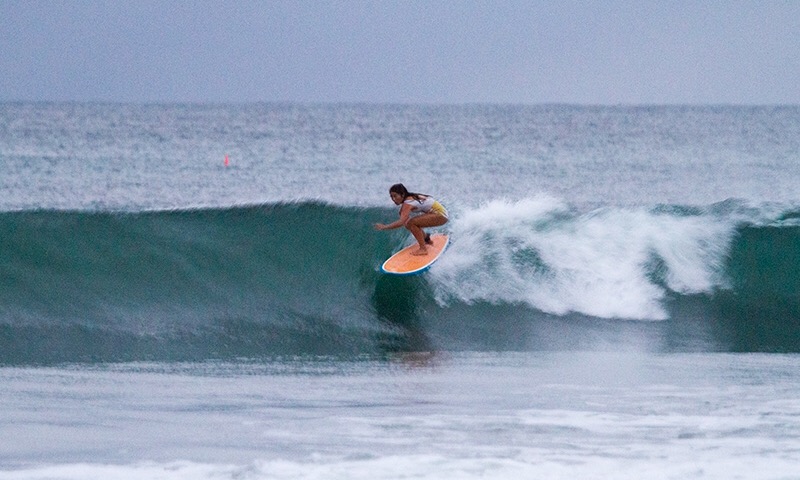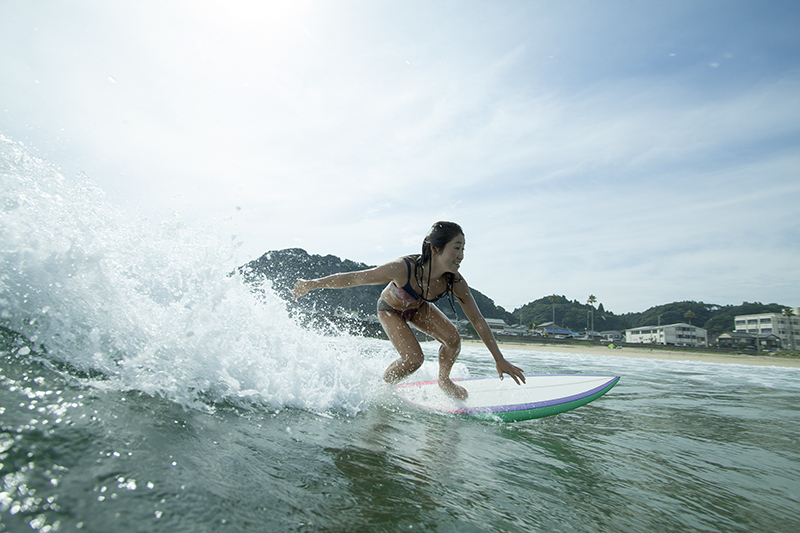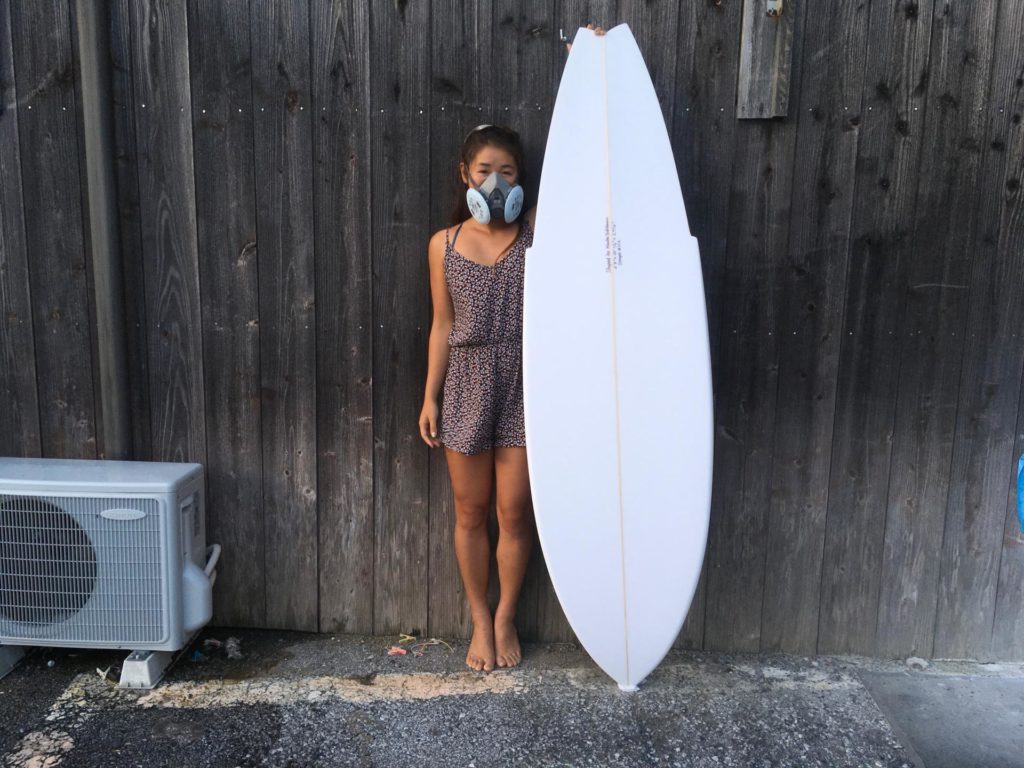25-year-old Hiroka Yoshikawa is already leading national women’s longboard championships, winning first place the past three years and competing internationally. Outdoor Japan’s Rie Miyoshi sat down with Onjuku’s surf darling to talk surf, life and Japan.
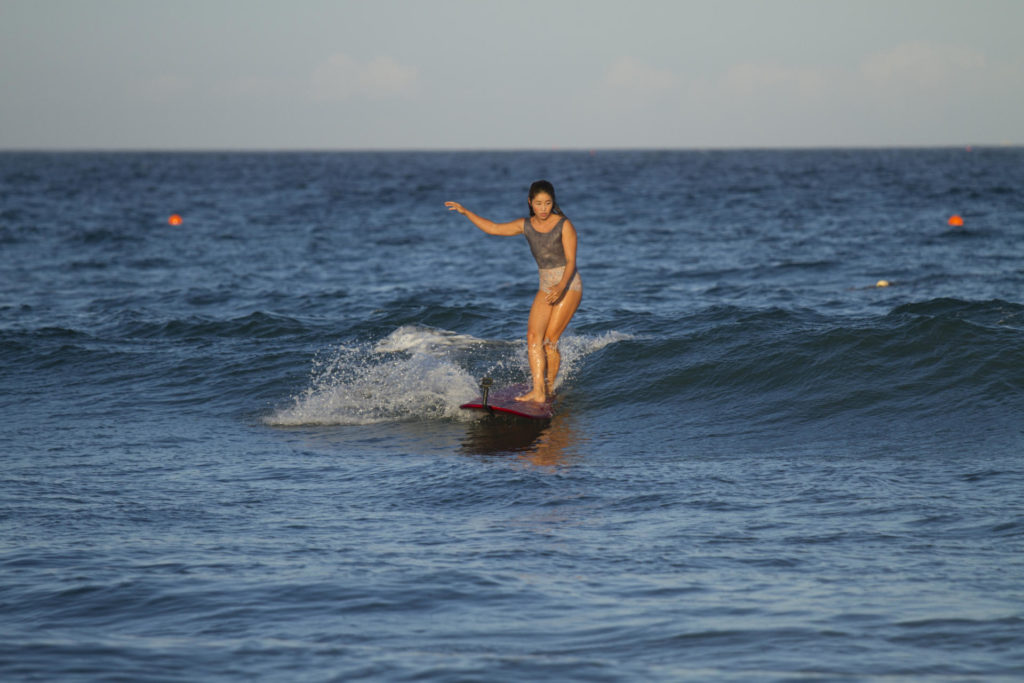
Rie Miyoshi: Sorry to pull you out of your morning surf!
Hiroka Yoshikawa: No worries. It takes a little over two hours to Tokyo from Onjuku, the inaka town in Chiba where I live. I rarely come into the city so when I do, I pack as many meetings I can while here.
RM: Are you originally from Onjuku?
HY: Born and raised. My parents are from Tokyo, but there are no waves there, so they moved to Onjuku to be near the ocean. My dad was a pro surfer and moved to Onjuku when he was 16 and my mom was a bodyboarder—they met through mutual friends.
RM: Do they still surf?
HY: Yes, and I have a younger sister who surfs as a hobby—we are a longboard family. Our house is a three-minute drive from the beach and dinner conversations usually revolve around tides and the next day’s waves. We’re always thinking and talking about the ocean.
RM: Growing up with surfer parents, were you expected to ride?
HY: My dad first put me on a board when I was in the second grade, but I just wanted to get out of the water as fast as possible. He didn’t push after that. Throughout middle school I was in the tennis club but when that finished, I started surfing and couldn’t stop. I would practice before and after school throughout high school—and of course, my dad was my biggest supporter. He even quit pro surfing and touring to become my coach.
My first contest was during my first year of high school. It was the Nippon Surfing Association Championship for amateurs of all ages. Starting in 2009, I placed rst for three consecutive years and kept competing even after graduating high school while working a part-time job at one of the oceanfront ryokan.
RM: What determines whether you’ve achieved pro surfer status in Japan?
HY: Before I went pro, I was invited to the Association of Surfing Professionals (ASP) contests—that’s the old name for World Surf League (WSL). I competed locally and overseas in France, China and Australia. The difference between long and shortboard competitions is that for longboard contests, points earned from international contests don’t count back home and I had to pay out of pocket. But I still applied and trained.
In 2012, I competed at Kamogawa, Chiba in the Japan Pro Surfing Association (JPSA) pro trials. The contest is held three times a year, and I failed the first two times. My score was always really close—I would be 0.1 points short from winning, I would place third, but after the third and final trial of the year, I won.
RM: Third time’s a charm. Are the other contestants around your age?
HY: I’m usually the youngest in the group. Most of the other contestants—actually, most surfers I see out in the water—are a decade older than me. There are a lot of women well over 40 years old still competing. It’s such a friendly community and everyone’s really encouraging.
RM: Do you see yourself competing long term?
HY: I’m not sure yet. My dad, Ryuji, runs a surf shop called Shoots on the first floor of our home and he also shapes boards. The other day he helped me shape my first board in the Stinger style popular during the 80s—wide body, a little heavy with wings making it easy to maneuver and ride classic style. Anyway, it was such a great experience to customize my own board, so I really want to get into shaping.
RM: Sounds like your dad has inspired you a lot.
HY: Definitely. Even when I lost competitions, my parents would always tell me to enjoy the ride. Also, all four of us in our family love crafts and making things. My dad makes lures, my mom sews and once we start a project, we get so focused on it. I think this built up my foundation for surfing and focusing on contests. We’re also really competitive.
RM: What’s your typical day like?
HY: When I’m not touring, I usually surf in the morning. If the waves aren’t great at Onjuku, I drive to a different surf spot, sometimes close by, other times further north like Ibaraki. Winter’s coming up which is the best season for surf in Onjuku. My mornings and evenings are dedicated to practicing on all sorts of boards-long, short, even handplanes. During the day, I work from home for an online surf goods store and sometimes give surf lessons or train on a SUP.
RM: Shonan, especially Chigasaki and Kamakura, has a surf town feel. What about Onjuku, are there a lot of local surfers?
HY: Surprisingly, there aren’t a lot of local Onjuku surfers, which is a shame because we have a beautiful beach with white sand, blue waters and great waves. I even get stared at when I’m out cycling with my board! Nowadays though, you see more surfers coming in from out of town or kids whose parents are local surfers.
Onjuku is a small town with roughly 8,000 residents and is famous for swimming, ryokan—and a famous statue of two men riding camels built on the beach. Tourists come for this, but I’m hoping it will develop into a surf town. Recently, we’ve started a Onjuku surfing committee.
RM: Were you much different from your friends growing up?
HY: Most of my friends from school don’t surf. Especially during that time, surfing was seen as charai (playful) with a negative reputation to it, so I worked extra hard to study well and not slack off while training.
RM: What would you like to tell people who don’t surf?
HY: Regular everyday life versus time spent in the ocean riding waves is so different and something everyone should experience. Surfing is part of who I am and I can’t imagine life without it.
RM: What other contests are left this year?
HY: I’m signed up for Surf Relik, an invite-only longboard series held in Malibu— it’s their first time doing it. I’m also really excited that Onjuku will be hosting its first WSL Asia event this November so I’m gearing up for that.
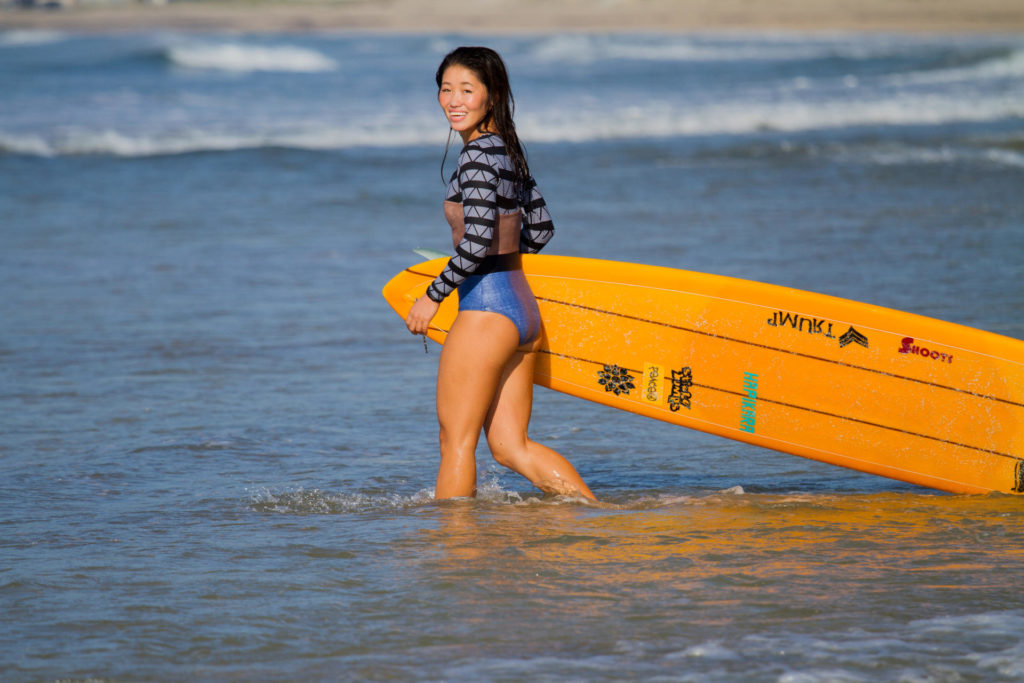
About Onjuku
Onjuku Beach, on the eastern coast of Chiba’s Boso Peninsula, is well-known for abalone and lobster fishing by topless ama female divers. Onjuku Station is on the JR Sotobo Line and takes just over two hours from central Tokyo. The WSL Trump Onjuku Logger Pro will be held on Nov. 11-12 featuring longboard, SUP, bodyboard and skateboard contests. Onjuku and its neighbor Hebara have English-speaking surf rentals and lessons.
Photos by Ryuji Yoshikawa





